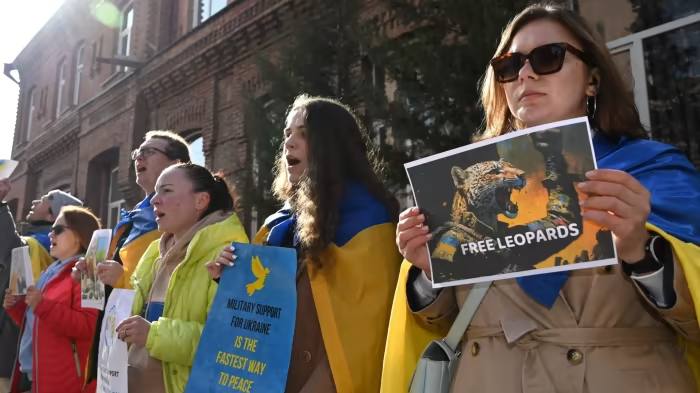Stay informed with free updates
Simply sign up to the World myFT Digest — delivered directly to your inbox.
Israeli ground forces pushed deeper into the Gaza Strip yesterday, rescuing a hostage held by Hamas, as the war threatened to escalate on multiple fronts.
The Israeli military said it had deployed additional “infantry, armour, engineers and artillery” in Gaza and killed dozens of Hamas militants in fighting in the territory, while Palestinians said Israeli forces had reached the outskirts of Gaza City.
At a time of mounting concern about the fate of more than 230 hostages captured by Hamas, Israeli military and intelligence authorities said that an Israeli soldier, Ori Megidish, had been released during ground operations by the Israel Defense Forces. Megidish is the first hostage to be rescued to date, although Hamas released four abductees last week.
Hamas also released a video of three other hostages in what Israeli prime minister Benjamin Netanyahu described as an act of “brutal psychological propaganda”. In the video, a woman identified as Danielle Aloni, a 44-year-old from the town of Yavneh, said Palestinian prisoners should be released by Israel to allow her and the other captives to return home.
The death of Shani Louk, a 22-year-old German-Israeli woman believed to have been abducted by Hamas, was also confirmed. Olaf Scholz, Germany’s chancellor, said her death “shows the full barbarity behind the Hamas attack” on Israel on October 7. He added: “This is terror, and Israel has the right to defend itself.”
Netanyahu, who has been criticised by the families of some hostages, later said Israel was “doing everything to return the hostages”, and batted away a question about whether he had considered resigning, saying: “The only thing that I intend to have resign is Hamas.”
“Calls for a ceasefire are a call for Israel to surrender to Hamas, to surrender to terror, to surrender to barbarism. That will not happen,” he added. “The Bible says there is a time for peace, and a time for war. Now is the time for war.” Here’s the latest on the conflict.
Gaza refugees: Netanyahu sought to convince European leaders to put pressure on Egypt into accepting refugees from Gaza, an idea they dismissed as unrealistic.
How Hamas fights: Faced with Israel’s technological superiority, the militant group has turned Gaza into a haven for guerrilla war.
Opinion: None of the Middle East’s big powers want further conflict, but it could happen nonetheless, writes Gideon Rachman.
The FT View: Israel has every right to defend itself, but its collective punishment of Palestinians trapped in Gaza must stop, writes the FT’s editorial board.
Here’s what else I’m keeping tabs on today:
Economic data: The EU, France, Italy and Canada report gross domestic product figures.
UK financial sector: Britain’s cap on bankers’ bonuses, inherited from the EU, will be axed from today.
King Charles in Kenya: The British monarch and his wife, Queen Camilla, begin a four-day visit to the African country, where he is expected to acknowledge “painful aspects” of the UK’s colonial history.
Companies: Anheuser-Busch InBev, BP, Fannie Mae, JetBlue and Stellantis report third-quarter results. Royal Mail chief Simon Thompson leaves the British postal service after announcing he would step down this year.
Join us for The Global Boardroom, where top FT journalists meet leaders in government and business, including the president of the European Central Bank, president of the Czech Republic, chief economist of the World Bank Group, CEOs of Novartis, Nasdaq and many more on November 8-10. Register for free today.
Five more top stories
1. Russia has restricted western companies that sell their Russian assets from withdrawing the proceeds in dollars and euros in an effort to shore up the rouble, which has depreciated more than 20 per cent against the dollar this year. Exiting companies could face delays and losses if they insist on receiving foreign currency for sales, according to people familiar with the matter. Here are more details on the de facto currency controls.
2. Exclusive: Spending on temporary workers and consultants has increased across many UK government departments, remaining at levels elevated by the pandemic even after the crisis has subsided. The findings have sparked accusations that Whitehall has failed to invest in skills across the civil service. Here’s more from the FT’s analysis.
Boris Johnson: The former prime minister changed “strategic direction every day” during the pandemic, according to private messages from the cabinet secretary revealed in the official Covid-19 inquiry.
More UK politics: Tory MP Paul Bristow has been sacked from his role as a ministerial aide after calling for a ceasefire in Israel and Gaza, while Labour suspended MP Andy McDonald for “offensive” remarks on the conflict.
3. Crude prices could rise to more than $150 a barrel if the conflict in the Middle East escalates, the World Bank warned yesterday, risking a repeat of the 1970s oil price shock if key producers cut supplies. A prolonged Israel-Hamas conflict could drive a “dual shock” for commodity markets still reeling from Russia’s war on Ukraine, it added. Here are the scenarios the bank has forecast.
4. Deals making Google the default search engine can be “very valuable”, the chief of parent company Alphabet conceded as he took the witness stand in a landmark antitrust trial. Sundar Pichai said such agreements for browsers and smartphones — worth billions of dollars annually — when “done correctly . . . can make a difference”. Here’s more from the most significant monopoly trial in 25 years.
More Big Tech: X is now valued at $19bn, the company told employees, a year after Elon Musk bought the platform formerly known as Twitter in a $44bn deal.
5. UK shop inflation has eased to its lowest rate in more than a year, dropping to 5.2 per cent this month in the fifth consecutive monthly decline. Data suggests the hit to households from historically high grocery costs is continuing to abate, helped by falling prices of homegrown food.
The Big Read
Governments around the world have made wind-powered energy central to their plans to cut emissions, setting ambitious targets for growth. To meet climate goals, offshore wind capacity will need to grow nearly 30 times by 2050. While most in the industry expect that capacity will continue to rise and that financial pressures will eventually ease, analysts increasingly doubt whether demanding targets for the technology will be met on time.
We’re also reading . . .
Chart of the day
Decades of failure have led to profound geographical inequality in the UK, writes Martin Wolf, and regional policy must be at the heart of any sensible strategy for growth.

Take a break from the news
There has been a Phoebe Philo-shaped hole in fashion since the designer stepped down from Céline in 2018. But five years later, Philo has returned with her long-awaited fashion line. FT fashion editor Lauren Indvik discusses whether the collection lives up to the hype.

Additional contributions from Benjamin Wilhelm and Gordon Smith
Recommended newsletters for you
Working It — Everything you need to get ahead at work, in your inbox every Wednesday. Sign up here
One Must-Read — The one piece of journalism you should read today. Sign up here















